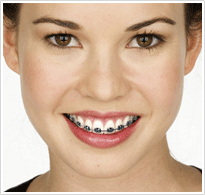TAKING CARE OF YOUR BRACES
 Braces play the key role in straightening or fixing crooked, protruding or crowded teeth. From cosmetic dental problems like gaps between teeth to complex dental issues such as malocclusions, braces serve as one of the most effective orthodontic treatment options for improving the teeth in terms of appearance and function.
Braces play the key role in straightening or fixing crooked, protruding or crowded teeth. From cosmetic dental problems like gaps between teeth to complex dental issues such as malocclusions, braces serve as one of the most effective orthodontic treatment options for improving the teeth in terms of appearance and function.
While braces are highly effective in addressing various dental problems, it is important to understand that special care is not only needed for maintaining braces but it is also necessary for ensuring that the teeth wearing these braces are in perfect health.
Tooth brushing and Braces
People wearing braces are concerned about the risk of breaking the brackets and wires, which is why they often avoid tooth brushing or following a proper oral hygiene routine. One of the major consequences of infrequent or improper tooth brushing is accumulation of plaque, which eventually loosens the brackets and damages the wires.
While brushing the teeth may appear difficult, ignoring the importance of oral hygiene will only make things worse. Dental experts suggest brushing the teeth’s front with slow up and down movements. The next step should involve thorough cleaning in between all the teeth. As the teeth are being brushed, special attention should be given to the back side of all teeth since this helps in preventing plaque accumulation behind the brackets. Ideally, the teeth should be thoroughly brushed for at least three minutes so that any residue or food bits left in the teeth or stuck somewhere in the brackets are washed away.
The Dos and Don’ts of Diet
For people wearing braces, being careful about foods that shouldn’t be eaten is a great way of avoiding problems with braces. According to dental experts, sticky foods like candy, gums and even raisins tend to adhere to the brackets and loosen them. In fact, flaky foods like popcorn can prevent braces from remaining intact.
Flossing and Braces
Flossing is one of the most important elements of a proper oral hygiene routine, which is often overlooked by many. Just as it is important to brush the teeth on a regular basis, flossing is also a must-follow habit that will help in avoiding plaque buildup. If plaque isn’t removed on time, it can badly stain the edges of the brackets. As plaque is the root cause of cavities, it will make the situation even worse by resulting in cavities that can’t be treated easily while wearing braces.
Dental Help for Braces
If a person wears braces, regular dental cleanings are not only important for cleaning the teeth but they are also useful in preventing serious dental issues such as gingivitis. Moreover, the dentist or orthodontist can also check the teeth for cavities or other problems during the visit. Ideally, dental cleanings should be done once every six months.
Lastly, it should be noted that ignoring the slightest problem with the brackets or wires can hinder treatment while delaying recovery period. Therefore, contacting the orthodontist is the first thing that should be done as soon as a problem or alarming concern arises.
